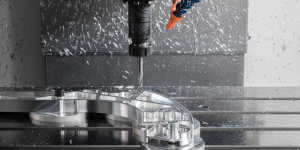Without machining, production is almost impossible. It makes the use of tools and equipment to mold the raw materials into the finished goods. Machining is a skillful and well-equipped technology that calls for qualified manpower and specialized technology. Industries such as automotive, aircraft, electronics, and medical devices are the ones that apply the technology.
The machining sector is important for implementation. It is the element that puts together all the vital parts. Quite a few companies demand exactness and intricate designs that can be only produced with machining. Manufacturing and technology development takes place through the machining sector.
Machining Industry Status
The manufacturing sector is riding on a wave of success. Machining services are being used more and more because the sectors are growing fast. Several big multinational companies and small and medium-sized enterprises are industry players. These businesses are specialized in milling, turning, and multi-axis machining.
CNC machines and additive manufacturing are the main trends that are taking part in the machining industry. Such technologies have greatly changed product manufacturing, and now it is more precise, effective and individualized. Automation and robotics of machining processes have led to more output and less payroll costs.
Machining Industry Growth Drivers
The manufacturing sector is expanding for several reasons including the following. Technology is an enabler to the development in machining processes. When it comes to the manufacturing of intricate shapes and patterns, CNC machines have the ability to do so at a very high level of precision. This helps producers to develop the specialty of manufacturing products.

As the machining industry is fueled by the demand for precision parts, it is gaining more space in the market. With the expansion of automotive as well as aerospace industries increased demand for components of higher quality is also inevitable. Machine shops that have the capability of delivering the exact and the exact parts are the ones that are in high demand.
The machining industry is one that has been developing along with the automotive and aircraft industries. The industries of machinery cover a lot of machined parts of cars and airplanes. The sectors that are growing will expect an increase in demand for machining services.
Machining Industry Growth Opportunities
The machining sector contains a lot of room for growth. The world of emerging markets presents an opportunity. Manufacturing services become required as people in developing countries are industrializing. Companies that get into those areas may get a huge growth in sales and customer base.
In addition to diversification of services, the growth of the machining industry is also being sought. Hence, with the inclusion of assembly, finishing, and testing, machining companies can take their services to the next level. Businesses will earn customers and will be able to gain market share by providing a mix of services.
The growth of the machine industry as well is determined by R&D investments in the machine sector. R&D serves as a catalyst for organizations to develop new technology, re-engineer processes, and edge past competitors. Innovation derived from R&D can be a critical factor to the transformation of the sector as well as the creation of new growth opportunities.
Machining Industry Challenges
Yet, the machining industry has all kinds of hurdles to clear. The skilled labor shortage is important. The number of machinists who are aging out is more than the number of the qualified replacements. This deficiency of skilled workers may thin the industry expansion and make it unable to provide machining service for the demand.
Machining is also exposed to the effect of low-cost country competition. The companies in the developed world will be under pressure because they will have to compete with the cheaper labor from the developing economy. Automation is one of the ways that machine shops can employ to solve the problem of low productivity. They can provide value-added services and differentiate themselves via quality and innovation to do so.
Another impact of environmental regulations is that they make machining harder. In the field of machining, local companies are required to adhere to the sustainable development goals which include cleaner emissions and waste treatment. The expenditure on the green technology and process may be higher in the beginning and the profitability may be lower compared to the use of traditional methods.
Strategies to Maximize Machining Industry Potential
Firms can make use of different methods in order to achieve the best of what machining capabilities can offer. Training and development are the main pillars of how to ease the skilled worker shortage. Training programs and apprenticeships mean that the organizations will attract and retain qualified machinists.

Collaborations with other industries are a tool that machining companies use to scale and broaden their customer base. Machine shops can give you a customized plan when they work together with design and engineering organizations.
To beat the competition, machining companies should implement the latest technologies. These companies may achieve efficiency by using additive manufacturing, AI and data analytics which in turn improves quality and innovation. Machine shops can be one ahead of the race if they become early adopters of these technologies.
Future of Machining
Hence, this machining firm generates precision parts and components which means it is a vital player in the manufacturing industry. The rolling stock industry is expected to grow as a result of the technological developments, growing demand for high precision components and automotive and aerospace expansion. The lack of skillful workers, the rivalry with low-priced countries, and the ecology regulation confound the business.
Through training and development programs, companies can invest in the development of their employees, and companies can also collaborate with other industries and adopt new technologies to gain competitive advantage. The resolution of these problems and the creation of new opportunities for expansion will allow the machining sector to be more successful and to develop manufacturing more and more. Machine tool companies should always be on the leading edge where the sector is going forward so they can be competitive and exploit the opportunities.
